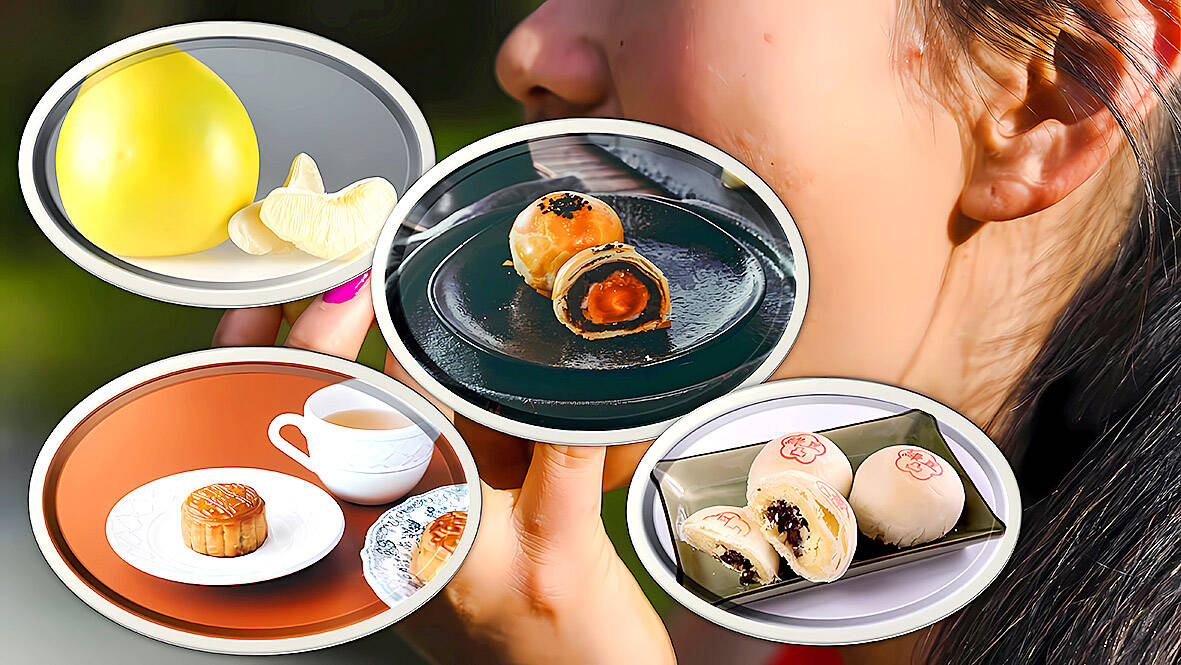對話 Dialogue
清清:時間過得真快,又是中秋節了!
Qīngqing: Shíjiān guò de zhēn kuài, yòu shì Zhōngqiū jié le!

Photo courtesy of Pexels and Wikimedia Commons / 照片:Pexels and Wikimedia Commons提供
華華:俗話說得好:「一年容易又中秋」,就是這個意思。而且還有一句:「年怕中秋月怕半,星期就怕禮拜三。」每到中秋,新年就又不遠了。
Huáhua: Súhuà shuō de hǎo: “Yì nián róngyì yòu Zhōngqiū”, jiùshì zhèige yìsi. Érqiě háiyǒu yí jù: “Nián pà Zhōngqiū yuè pà bàn, xīngqí jiù pà lǐbài sān.” Měi dào Zhōngqiū, xīnnián jiù yòu bù yuǎn le.
清清:我是不怕禮拜三啦!眼看著週末就要到了,高興都來不及。只是過年又要老一歲了,這倒真是令人害怕。
Qīngqing: Wǒ shì búpà lǐbài sān la! Yǎnkànzhe zhōumò jiù yào dàole, gāoxìng dōu láibùjí. Zhǐshì guònián yòu yào lǎo yí suì le, zhè dào zhēnshì lìng rén hàipà.
華華:怕也沒用,該來的總會來的。看看嫦娥得有多老了,還不是代代相傳,直到今天我們還在「慶祝」她奔月去了呢!
Huáhua: Pà yě méiyòng, gāi lái de zǒng huì lái de. Kànkan Cháng’é děi yǒu duō lǎo le, hái búshì dàidài xiāngchuán, zhídào jīntiān wǒmen hái zài “qìngzhù” tā bēn yuè qùle ne! le, hái búshì dàidài xiāngchuán, zhídào jīntiān wǒmen hái zài “qìngzhù” tā bēn yuè qùle ne!
清清:哈哈哈!說的也是。你家今年準備了哪些應景的食品呢?
Qīngqing: Hahaha! Shuō de yěshì. Nǐ jiā jīnnián zhǔnbèile nǎxiē yìngjǐng de shípǐn ne?
華華:我買了月餅,還有朋友送的蛋黃酥、綠豆椪和柚子,可以說是應有盡有了。
Huáhua: Wǒ mǎile yuèbǐng, háiyǒu péngyǒu sòng de dànhuáng sū, lǜdòu pèng hé
yòuzi, kěyǐ shuō shì yīngyǒu jìnyǒu le.
清清:是喔?烤肉呢?少了這個,就不像台灣的中秋節了。要是沒準備,晚上請你們全家都到我們家來吧!人多熱鬧,歡迎喔!
Qīngqing: Shì o? Kǎoròu ne? Shǎole zhèige, jiù bú xiàng Táiwān de Zhōngqiū jié le. Yàoshi méi zhǔnbèi, wǎnshàng qǐng nǐmen quánjiā dōu dào wǒmen jiā lái ba! Rén duō rènào, huānyíng o!
華華:好的,我問問再告訴你,先謝謝囉!
Huáhua: Hǎode, wǒ wènwen zài gàosù nǐ, xiān xièxie lo!
翻譯 Translation
Qingqing: How time flies! It’s Mid-Autumn Festival again.
Huahua: As the saying goes, “A year passes easily and it’s Mid-Autumn again,” which captures this feeling perfectly. And then there’s: “The year fears Mid-Autumn, the month fears mid-month, and the week fears Wednesday.” When Mid-Autumn comes, the New Year isn’t far behind.
Qingqing: I’m not afraid of Wednesdays, I’m just excited that the weekend is almost here. The only scary thing is that I’ll be another year older when the New Year comes.
Huahua: No need to be afraid, just take things as they come. Look at Chang’e, she must be really old by now, yet we’re still “celebrating” her flight to the moon to this day.
Qingqing: Haha, that’s true. What festive foods has your family prepared this year?
Huahua: I bought mooncakes, and friends gave me egg yolk pastries, mung bean cakes and pomelos. We’ve got everything we need.
Qingqing: Really? What about barbecuing? Without that, it wouldn’t feel like a true Taiwanese Mid-Autumn Festival. If you don’t have plans yet, bring your family to our place tonight. The more, the merrier. You’re all welcome to come over.
Huahua: OK, I’ll ask and let you know. Thanks for that.
生詞 Vocabulary
1. 中秋節 (Zhōngqiū jié) Mid-Autumn Festival
2. 俗話說得好 (súhuà shuō de hǎo) [phrase] As the saying goes, …
3. 眼看 (yǎnkàn) soon, in no time
4. 來不及 (láibùjí) not enough time, too late
5. 代代相傳 (dàidài xiāngchuán) [idiom] passed down through generations
6. 奔 (bēn) run, rush, dash, flee
7. 應景 (yìngjǐng) Festive, appropriate for the occasion
8. 應有盡有 (yīngyǒu jìnyǒu) [idiom]
have everything you need
教材音檔 Audio Files
國立清華大學華語中心提供
By National Tsing Hua University Chinese Language Center:

Computex, Asia’s biggest electronics conference, kicked off Monday in Taipei, and as in years past drew industry chieftains from Nvidia Corp.’s Jensen Huang and Qualcomm Inc.’s Cristiano Amon to Young Liu of Foxconn, which makes the bulk of the world’s iPhones and Nvidia servers. But while last year’s event was a celebration of the post-ChatGPT AI boom, executives this time are likely grappling with the uncertainty of the Trump administration’s effort to reshape the global trade order — disrupting a decades-old model for tech manufacturing. This year’s exhibition will of course feature the hardware required to bring artificial intelligence to life.

For many people, allergies are an all-too-familiar annoyance. The constant sneezing, itching, and watery eyes are just a few clear signs of allergies, which is a surprisingly common condition affecting millions worldwide. But what exactly triggers these reactions, and how can we cope with them? Allergies arise from a misunderstanding between our immune system and seemingly harmless substances. Under normal circumstances, the immune system acts as our body’s personal bodyguard, diligently identifying and eliminating threats like viruses and bacteria. However, in individuals with allergies, the immune system mistakenly identifies certain substances, called allergens, as invaders. This triggers a reaction, leading to

1. 眾所皆知,資訊產業是我國經濟的基礎。 ˇ As everyone admits, the IT industry is the backbone of our economy. χ As everyone admits that the IT industry is the backbone of our economy. 註:這裏 as 作關係代名詞,引導從屬子句。誤句多了 that, IT industry is. . . 就變成從屬句,欠缺了主句,結構上錯誤。又如: As my friend pointed out, necessity is the mother of invention. As is known to all, grammar is not the only important thing in language study. 2. 她心情總是非常好。 ˇ She is always in a good mood. χ She always is in a good mood. 註:always, often 一般放在行為動詞之前,連繫動詞、助動詞之後: He always behaves well. He is always happy and gay. He is always reading. 其他用法類似的副詞,還有 still、also、hardly、seldom、never 等。 3. 你看!他還在寫報告呢。 ˇ Look! He is still working

Continued from yesterday(延續自昨日) https://www.taipeitimes.com/News/lang Training a dog to use the buttons requires a great deal of time and patience, but certain techniques can be employed to speed up the process. Secure the buttons to the floor __4__ they don’t move and dogs can easily recognize their positions. Additionally, starting training with an activity that highly motivates the dog can accelerate learning. For instance, if a dog is more interested in walks than in food or water, it may learn to press the “walk” button __5__ than it learns to press the other two. By using these buttons, dogs are able to express